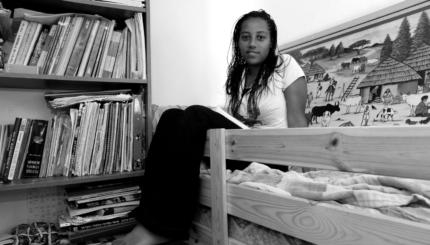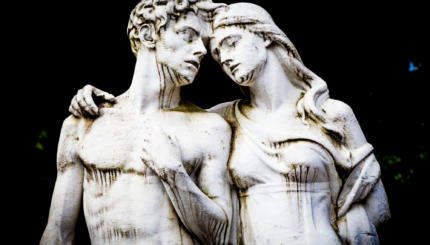The wedding hall is packed as Tali and her now-husband Natan, both Ethiopian Jews, celebrate their wedding with nearly 900 of their Ethiopian-Israeli family members and friends. The couple exude positivity and excitement and the guests are equally excited. We are treated to an elaborate cocktail hour followed by an exquisite sit-down dinner, and a DJ entertains us until 2am with a mixture of Ethiopian, Israeli, and American music.
As I look around the room at hundreds of Black Jews enjoying this joyous occasion, all of us together in a physical space and connected by a shared experience, I become emotional. I’m surrounded by so many Black Jews, people who look like me, accept me, and understand the complexity of the identity that we share.
For the first time in my life, I am not a minority. My blackness does not define me; it is the norm. My Jewishness does not define me; it is the norm. I am the norm, existing beyond my identities.
In that moment, I belong to Judaism, to the Jewish people.
***
I have always been a minority, and, as such, I have always had my Jewish identity questioned. I was raised in a predominantly white and non-Jewish Philadelphia suburb and was constantly asked to defend my Jewish identity. People could not believe that my parents were Black Jews, that I had a Bat Mitzvah, and that I attended Hebrew school. The most painful aspect of the assault on my identity was that it came primarily from other Jews.
As I got older, the scrutiny intensified and my connection to Judaism waned. My fragile Jewish identity was shattered when I was rejected from Birthright and told that I was not a Jew. I appealed the decision on grounds of discrimination, and Birthright eventually overturned its decision, but I refused to go on principle. Fortunately, through my friendship with my Jewish college roommate and the supportive Duke Jewish community, I slowly reclaimed my Jewish identity.
In 2010, I moved to Israel on a year-long leadership fellowship sponsored by the Dorot Foundation. The fellowship provides the opportunity to live in Israel, develop leadership skills, and address important issues in the Jewish community. As a Black and Jewish woman, part of a minority consistently excluded from and not represented in the Jewish community, I sought to examine the diversity of the Jewish people by showcasing diverse Jewish narratives. During the year, I traveled around Israel interviewing Jews of color and documenting their stories. My intent was to create a sense of belonging for minorities like me who exist outside of the white, Ashkenazi norm.
At the Western Wall, July 2019. (Courtesy of Celeste Jackson)
The first months of my Dorot experience were enjoyable but not fully satisfying. I had a supportive cohort and I learned a lot, but I felt like a visitor, disconnected. Fortunately, I befriended Tali. As a woman of color, she understood me and could relate to my sense of “otherness” in the Jewish community. While Tali and I came from different cultural and national backgrounds, we learned from one another and connected over our shared experiences: namely, the challenges of discrimination and institutional racism that both Black Israelis and Black Americans face and the questioning or denial of our Jewish identity. Tali helped me unpack the diverse and complex question of Jewish peoplehood and reinforced my sense of belonging.
***
Almost nine years after I met Tali, I find myself back in Israel at her wedding. While much has changed in our lives, much remains the same. Our respective communities still experience bias and discrimination, our identities are still questioned, and race remains an important issue. For this one day, however, we pause that reality to celebrate this marriage and the beauty of our collective, diverse identities.
After the wedding festivities, it’s back to reality. On the day of my departure, I arrive early to Ben Gurion airport to allow extra time to get through security. I’m asked the standard security questions, and then, as usual, I’m flagged and moved to a heightened security line. And just like that, I return to being “other,” the sum of my seemingly inconceivable identities, existing outside of the norm.



